
Sport Australia warned the then minister Bridget McKenzie that she could not claim to have followed a “rigorous, transparent and defensible” process under the controversial sports rorts program if she defied the organisation’s recommendations, along with a caution that she would have to defend her handling of the program at Senate estimates.
Emails provided to a Senate inquiry probing the community sport infrastructure grant program reveal that Sport Australia fired its first warning shot to the minister about her handling of the $100m fund as early as December 2018, raising concern that she was overriding recommendations in the first round of the program.
In this round, a scathing auditor general report found that almost half of all the projects that secured funding had not been recommended by Sport Australia after it conducted a merit-based assessment process.
The email, sent by the executive director of sport partnerships, Robin O’Neill, said that the organisation wanted to “reinforce” advice to the minister about her decision to go against the recommendations of the assessment panel.
“One of the issues would be the reputational risk funding decisions could be perceived as favouring localised projects that did not meet the assessment criteria,” the email said.
“The minister is advised that as the delegate she may need to defend the decisions at Senate estimates.
“If changes were made she could not state that she approved the recommended decisions of the industry panel that followed a due process where a rigorous transparent and defensible process took place,” O’Neill said.
In a further email sent three days later, O’Neill suggested a “high risk” was associated with funding projects that did not receive high enough assessment scores.
“Projects ranged in score from 59 to 39 are considered too low to fund without significant risk to the completion period and/or safe passage of the project,” O’Neill sys.
“It is our role at Sport Australia to provide transparent, consistent assessment via agreed guidelines and funding criteria. Sport Australia cannot put forward projects for funding that do not meet a score cut off or that do not meet the program guidelines.
“If there are projects that the minister’s office wishes to fund, you may choose to select those projects and fund them separately via a ministerial budget – noting the risks to successful completion through the project assessment.”
The emails between McKenzie’s office and Sport Australia also reveal that nine projects that had not been recommended by Sport Australia, but which were approved in the third round, had been picked by the government for funding even before round three was formally put in place.
An email from McKenzie’s office sent on 25 March – two weeks before caretaker period – asks the agency to “prepare a list for round 3 of $39.6 million in projects”, which included the nine projects, for which Sport Australia was given extra funds to assess.
None of the nine hand-picked projects that successfully secured grants were recommended by Sport Australia for funding.
The emails also show that O’Neill repeatedly warned that it would be inappropriate to accept new applications, or to allow some existing applications to be edited when the opportunity was not granted to others.
In the final round, the auditor general found that 73% of the projects funded by the minister had not been recommended by Sport Australia.
The Greens senator Janet Rice said the emails were further evidence of the Coalition ignoring expert advice and warnings in favour of deliberately misusing public money to prop up their electoral fortunes.
“Then minister McKenzie’s office was told in multiple emails from Robin O’Neill that it would be unfair and inappropriate to let only some sports clubs edit their applications – other clubs had been told they couldn’t – and to invite new applications after the program had closed,” Rice told Guardian Australia.
“The Coalition doubled down, and again snubbed Sport Australia’s concerns when funding the nine new and amended projects in Round 3.
“In these fraught times, when people are in need of huge support as we deal with the impacts of the coronavirus, we need to be able to trust the government to distribute our money wisely and fairly.”
Rice said the government needed to show “radical transparency and accountability” with the billions in stimulus funding about to flow to address the fallout from the coronavirus pandemic.
The Senate inquiry is waiting to hear further evidence from McKenzie about the grants process, with particular scrutiny to be applied to changes made to the list of projects the minister’s office asked to be funded as the government entered caretaker mode.
McKenzie maintains she made no changes to the funded projects after she signed the brief on 4 April, and does not know who added nine projects and removed one after this date.
The prime minister, Scott Morrison, has refused to take questions on whether his office was involved in the late changes, after the audit office gave evidence that 136 emails were exchanged between the prime minister’s office and the sport’s minister office about the program.
Morrison maintains his office was only passing on representations and had no role in the decision-making process.
[“source=theguardian”]







